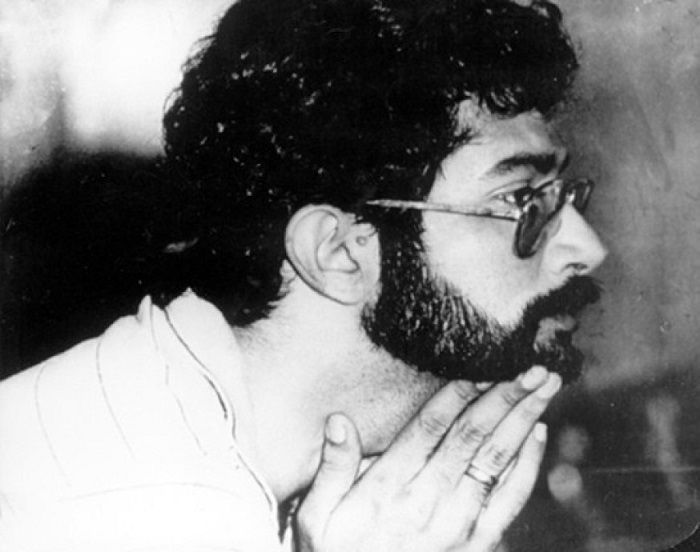
By Roel Raymond
On Saturday (14) the family of the late slain journalist Richard de Zoysa met at the Chapel of Transfiguration at the S. Thomas’ College Mt. Lavinia, to give thanks for a life brutally taken 31 years ago. Early in the morning on February 18, 1990, Richard was abducted from his home. His body; jaw broken, shot in the head and throat, washed ashore on a beach in Moratuwa the next morning. This was during the height of the Premadasa presidency.
Richard was not the first journalist to be abducted and slain in Sri Lanka. He is also not the last. And as his cousin, Dr Paikyasothy Saravanamuttu pointed out at the thanksgiving service on Saturday, “what would (de Zoysa) do if he was here today, given that what he gave his life for 31 years ago, is still happening in a variety of guises.”
Richard was my uncle. I did not know him personally, I was very young when he was killed, but I have previously written about how his life looms large over me, shaping the decision I made to continue in my craft. But inasmuch as his life inspires me, his death, too, holds me back.
I have long argued with family, friends, and perhaps most specifically with my uncle Dr Saravanamuttu, who continually challenges me to do more and say more, that I have no intention of dying. “I am not the saviour,” I have proclaimed firmly to him. “I am not here to save the world. I am only here to do my job.”
I have had justifications for my argument. I sincerely do not want to die. I sincerely do not want to end up imprisoned. Moreover, in understanding the nature of power — I have argued with those who will listen — I understand that small men and women will be continually crushed by the men and women who are single-minded in pursuit of power. I am a small woman, who did not in any way want to be overpowered by anyone who felt I stood in their way of power — because I was in no pursuit of power.
But small, or large, power is inherent. And in our silences, our refusal to engage, we give our power away to those who understand it, value it, and want it far more than we do.
These are the politicians who come up, crop after crop, generation after generation, wheedling their way into our lives by crafting public personas that are genial, promising and pleasing. And in this ‘one-vote’ system we live in, we give our valuable to ‘one-vote’ — our power — to the people most able to manipulate and hoodwink us.
Journalism, too, in Sri Lanka today, has morphed into power-sharing arrangements; power is given away in informal arrangements that are mutually beneficial to the politicians and the scribes. The shallow pursuit of public acknowledgement and popularity have overshadowed sensibilities and civic responsibilities.
To hold our leaders — both those in power, and those seeking power — accountable, there must be a radical understanding of the very nature of our work, and a commitment to the higher ideals that come with it. While Sir John Dalberg-Acton, the 1st Baron Acton is credited with the remark, “Power tends to corrupt, and absolute power corrupts absolutely,” I side more with the Pulitzer-winning author Robert Caro’s remark, “Power always reveals.”
Power reveals character and integrity, and if we look closely enough, where we ought, and are not afraid to reveal the truth, we won’t have to wait till power is amassed for a public exposition of a leader’s character and integrity; signs of these are apparent very early on, and almost without exception continue throughout. But in the absence of moral compunction and compass, Abraham Lincoln’s appeal to the “the better angels of our nature,” goes unheeded, and people, and journalists — are easily manipulated.
In his remarks at the memorial for Richard on Saturday, the Reverend Marc Billimoria added to what had thus far been a private wrestling in the innermost of my being. “Dying for truth as justice is nothing strange, to members of the Christian church,” he told the audience. “The Judeo-Christian tradition, as expressed in the Bible, demands of its followers a radical commitment to truth and justice, as well as advocacy on behalf of the voiceless, the helpless and the harassed.”
As a practising Christian, I know I cannot continue to ignore the call to action. But for those who are not of my faith, consider the words of Aleksandr Solzhenitsyn, a Russian novelist and political prisoner, who said, “The line separating good and evil passes not through states, nor between classes, nor between political parties either – but right through every human heart.”
Solzhenitsyn did not end there. “…even within hearts overwhelmed by evil, one small bridgehead of good is retained,” he wrote in The Gulag Archipelago. “And even in the best of all hearts, there remains…an uprooted small corner of evil.” This is true of human nature, and yet, we still have power. We have the power to intentionally choose to live lives that are built on the values of truth, justice and equality, that are not harmful to those around us and the generations to come.